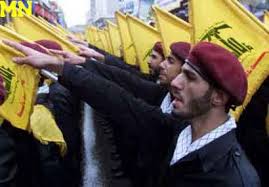 Lebanon’s Hezbollah has expressed strong reservations about Beirut’s signing of the Jeddah Communique pledging regional military cooperation against the Islamic State of Iraq and Syria (ISIS), with sources close to the group warning that the agreement both goes too far and does not do enough to confront the Islamist terrorist group.
Lebanon’s Hezbollah has expressed strong reservations about Beirut’s signing of the Jeddah Communique pledging regional military cooperation against the Islamic State of Iraq and Syria (ISIS), with sources close to the group warning that the agreement both goes too far and does not do enough to confront the Islamist terrorist group.
Lebanon’s Hezbollah-led March 8 Alliance called on Beirut to provide “clarification” regarding the future Lebanese role in the international coalition being assembled to confront ISIS in Iraq and Syria.
Ten Arab states attended a regional meeting on terrorism and ISIS in Jeddah on Wednesday, signing a joint communique agreeing to undertake a range of actions to combat terrorism, including stopping the flow of foreign fighters through neighboring countries, countering the financing of ISIS and other terrorist groups and repudiating jihadist ideology.
The regional states also agreed to “join in the many aspects of the coordinated military campaign against ISIS, as appropriate, according to the communique.
Lebanese Information Minister Ramzi Joreige told Asharq Al-Awsat that the “Lebanese army is ready and able” to fight ISIS.
Speaking to Asharq Al-Awsat on the condition of anonymity, a source close to Hezbollah said: “Lebanon’s official position in terms of its commitment to the fight against terror has been clear since 2000.”
The source said that any additional responsibilities must be taken “within the framework of a clear plan that determines Lebanon’s role,” criticizing the Jeddah Communique’s vague language.
He added that Hezbollah considers Lebanese Foreign Minister Gebran Bassil’s signing of the communique as non-binding until an official clarification is issued by the Beirut government.
By merely attending the Jeddah meeting Bassil had “buried” Lebanon’s “unrealistic” policy of self-distancing, the Hezbollah source maintained.
Hezbollah finds itself in an increasingly difficult situation over the anti-ISIS regional coalition. The Lebanese Shi’ite militia is fighting alongside Bashar Al-Assad forces in Syria; however the US and Arab regional states are backing the Free Syrian Army (FSA) against ISIS, not the Assad regime. Assad and Hezbollah fear that any military assistance provided to Syrian rebels to fight ISIS could later be turned on the Assad regime.
US President Barack Obama earlier this week said the US would seek to carry out airstrikes against ISIS targets in Syria. Washington has said it will not ask Assad’s permission to conduct military operations in Syria, refusing to cooperate with the Assad regime and Iran over ISIS.
Pro-March 8 Alliance media outlets hit out at Bassil’s participation in the Jeddah meeting, claiming that the communique did not go far enough to tackle ISIS.
Lebanon’s political actors are divided about the domestic repercussions of a US-led military campaign to combat ISIS, particularly given ISIS’s own presence in Lebanon.
Lebanese local media this week reported that ISIS could have as many as 40 “secret cells” in Lebanon, according to a security report. The ISIS cells are made up of Lebanese, Syrian, Palestinian, Jordanian and Iraqi nationals and are reported to be highly trained in weapons and explosives, according to the media reports.
In comments to Asharq Al-Awsat, Hezbollah MP Walid Sukkarieh said Lebanon’s anti-ISIS efforts should be directed towards the “protection of the domestic scene against ISIS expansion” into Lebanon.
Sukkarieh warned against the presence of militants affiliated with ISIS along the Anti-Lebanon Mountains, urging signatories to the Jeddah communique to provide Beirut with political and military support to take action against the Islamist group.
Bassil is the son-in-law of Free patriotic Movement leader MP Michel Aoun, a close ally of the Hezbollah militant group.
Iran excluded
It is worth mentioning that Iran, Hezbollah’s main backer has been excluded from participation in the coalition of nations that will be fighting ISIS.
US Secretary of State John F. Kerry says Iran should not attend a conference about the militant threat that will be held Monday in Paris and Iran did confirm that it will not be attending .
“It would not be appropriate given the many other issues . . . with respect to their engagement in Syria and elsewhere,” Kerry said Friday. He cited Iran’s military support for Syrian President Bashar al-Assad and alleged Iranian support for terrorist groups elsewhere.
Asharq Al-Awsat/YL

Leave a Reply
You must be logged in to post a comment.